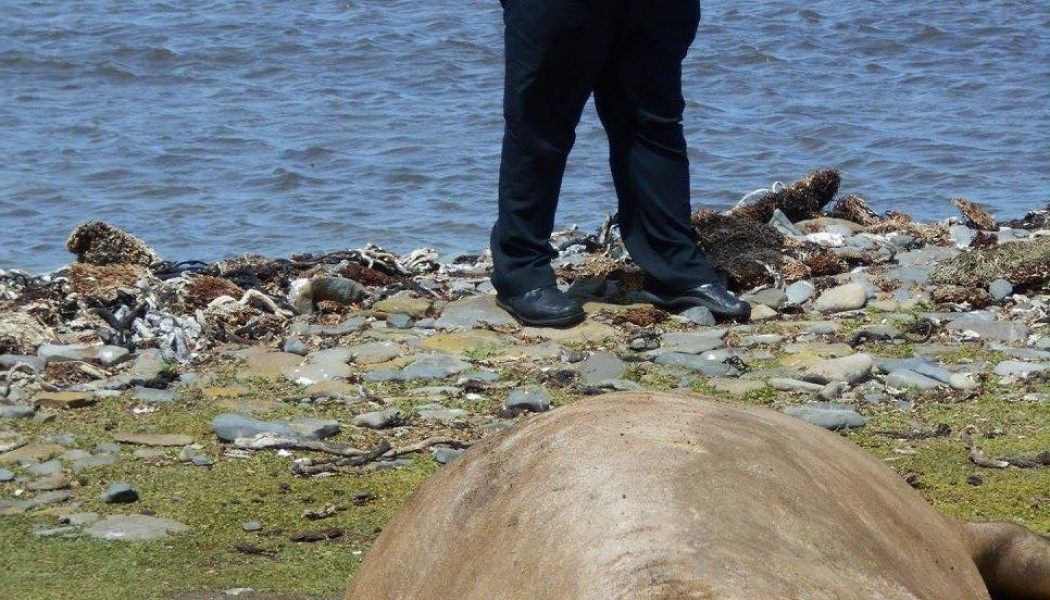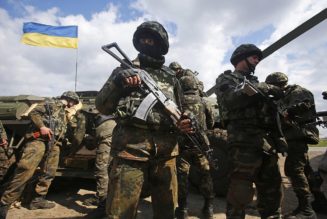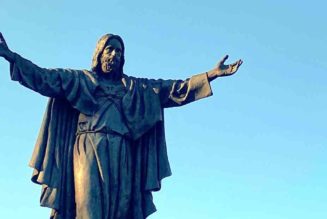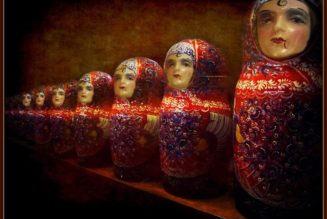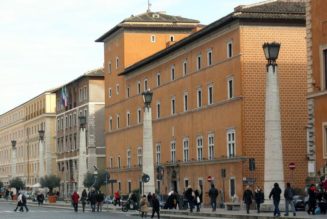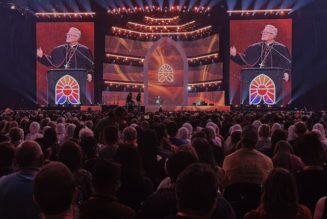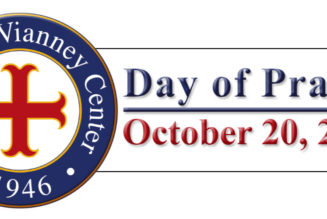Abbot Hugh Allan has an interesting pastorship. Saying Mass, of course, is the highlight of his visits, which include visits with local Catholics and enjoying the expansive scenery and wildlife. (Abbot Hugh Allan)
K.V. Turley
LONDON — The Catholic Church in the British Overseas Territories of the southern Atlantic Ocean is governed by two ecclesiastical jurisdictions: the Apostolic Prefecture of the Falkland Islands and the Ecclesial Mission sui iuris of St. Helena, Ascension and Tristan da Cunha. Both of these are directly responsible to the Holy See.
From the 18th century onwards this large ecclesial territory was a mission field for the French and then the Spanish. In the 19th century, Irish priests came to serve the needs of Catholics on these islands. Since 2002, however, the Catholic Bishops Conference of England and Wales has been given responsibility for the pastoral needs of Catholics in the South Atlantic area.
In 2016 English Premonstratensian (i.e., Norbertine) Abbot Hugh Allan was made the apostolic administrator of the prefecture and ecclesial mission. Last fall, while debates in Rome focused on the Amazon region, Abbot Hugh spoke to the Register about the challenges of ministering to his far-flung flock in one of the remotest parts of the world.
Tell us a little about your vast “diocese.” Where is it?
Well, technically it is two ecclesiastical areas. One is the Apostolic Prefecture of the Falkland Islands, and the other is the Ecclesial Mission sui juris of St. Helena, Ascension Island and Tristan da Cunha. However, since 1986 (when the Ecclesial Mission was established), the head of the prefecture has also been the superior of the mission.
Together, these two areas make up one-sixth of the surface of the globe! 99.9% of that is water, but there are several hundred islands, as well.
Geographically, it is the largest ecclesiastical territory in the Catholic Church. In 2016, I was appointed to look after this mission. The four permanently inhabited islands are the Falkland Islands, St. Helena, Ascension Island and Tristan da Cunha. All of these islands have a rich history; and until the development of air travel, they were important “stopping points” for mariners sailing around the world.

How many “sheep” are in your flock?
Actual sheep [that is, livestock], there are around half a million sheep on the Falkland Islands!
On the Falklands there are around 2,500 people, on St. Helena around 5,000 people, on Ascension Island around 700 and on Tristan da Cunha about 250 people. The highest numbers of Catholics are found on the Falkland Islands and on Tristan da Cunha. All of the islands have a Catholic church or grotto.
How many priests and parishes do you have? And how does it all work?
At the moment, there are two priests who work full time on the islands. Benedictine Father Ambrose Bennett is the parish priest of St. Mary’s parish, Stanley, which covers the whole of the Falkland Islands. Father David Musgrave is the parish priest of Sacred Heart parish, which covers St. Helena and Ascension Island. St. Joseph’s on Tristan da Cunha is looked after by three catechists and a priest visits each year in September. Like any ordinary of a diocese, I travel around all the “parishes” (islands!) each year. My task is to support these two wonderful priests in their work for the Lord and to ensure they have everything they need to proclaim the Gospel of Jesus Christ.
Tell us about some of the distances involved in your ministry? Do you spend all your time traveling?
The distances involved are the most challenging part of the mission. Traveling to the Falklands involves a daylong journey from the United Kingdom on a military transport. There is a flight twice a week from RAF Braze Norton [airfield] to Cape Verde and then from there down to the Falkland Islands. St. Helena now has an airport, and it is easier to travel there from South Africa. The difficulty is that, due to a number of factors, the flights do not always take off on the right day. A number of times I have stayed for a week or so longer on a visit to the Falklands because of flight delays. The longest journey is to Tristan da Cunha. It is the most remote inhabited island in the world! The only way to get there is by ship from Cape Town. This journey is five or six days, but can be a lot longer, depending on the weather conditions. With all the traveling, you just have to be patient and very much “go with the flow.”
What are the particular pastoral challenges you face with those souls entrusted to you in the area you are responsible for?
The distances involved and the unpredictable nature of transport: This can make arranging any pastoral journey difficult. For the parishes, it means planning a long way ahead for all their needs. On both the Falkland Islands and St. Helena, there is also the challenge of a large number of contract workers who can be there for six months or two years. This means that people come and go a lot. So, for a while, you may have someone to play the organ on Sunday, but then their contract changes, and you are left singing a cappella!
What are some of the most rewarding aspects of your ministry?
The isolation and the small number of people involved can mean that these long journeys seem odd. Quite often I have people in the U.K. say to me, “What — you really spend nine days traveling just to look after a few people?” I think one of the most rewarding aspects of this ministry is knowing that each soul is a precious gift, and the salvation of souls means that everyone is precious to God. It also speaks of the great care and love of the Church — that even the most remote communities and most isolated souls are not forgotten. For example, on my last visit to the Falkland Islands, I saw a lady who had only recently moved to the islands but had become quite ill. I heard her confession and gave her Holy Communion. As I was leaving, she said to me: “Father, you know, I know God loves me. You know why? Because he sent you 8,000 miles so I could go to confession and receive my Lord.” Moments like that make the journey well worth it.
What has this mission taught you about your priestly ministry?
To trust God. He is the one who looks after this mission. They are his people, and he has them in the palm of his hand. For me, I have learnt the great need for patience! [Author of Abandonment to Divine Providence] Jesuit Father Jean Pierre De Caussade [1675-1751] talks about living in “the sacrament of the present moment,” and that is something you really have to take to heart in this ministry — to abandon yourself to divine Providence and simply say, “Lord, thy will be done.” When I was appointed, I took as my motto Finis fidei salus animarum (“The goal or end of faith is the salvation of souls”). Really, that is the heart of any priestly ministry, and I try each day to do all I can to give glory to God and work for the salvation of souls.

What has your experience taught you about ministering to people in far-flung regions?
For the people I meet in these communities, God is someone immediately connected to their lives. The remoteness of the place seems to open their hearts more to the presence of God. On St. Helena, I met so many incredibly kind and loving souls. Talking about God and their faith was not awkward or difficult. One man greeted me every day by saying, “God is alive.” Of course, the islanders all face difficulties, but there is a kindness and calmness that radiates Resurrection joy.

On Tristan da Cunha, the island’s motto is “Our faith is our strength.” A shining example of this strong faith is the building of their new church in the 1990s. It was a time when the prolonged absence of a priest and other pressures had led to a fall in church attendance. The remaining faithful decided to pray a novena together, asking the Lord to bring their families and friends back to the Church. Having done this, they reckoned that when God had answered their prayers they would need a bigger church. So they set about constructing a larger one. Sure enough, numbers increased, and the new church was filled. God is alive!
K.V. Turley is the Register’s U.K. correspondent.
